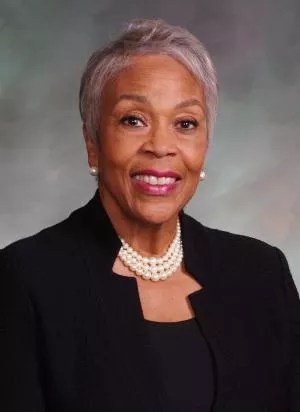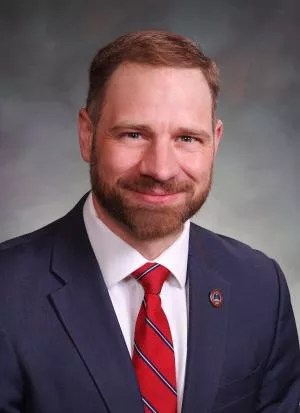
Hannah Metzger

Audio By Carbonatix
Less than three weeks ago, Colorado voters selected state senators to represent them in the Capitol for the next four years. But in two districts, the winning candidates have already stepped down.
Democratic senators Chris Hansen and Janet Buckner both submitted letters of resignation mere weeks after they were re-elected to their seats on November 5. A third senator, Republican Kevin Van Winkle, announced his resignation on Friday, November 22, two years into his first four-year Senate term after he was elected to be a county commissioner.
Replacements for all three senators will be chosen via vacancy committees – groups led by the outgoing senators’ political party, consisting of local precinct organizers, party officers and other registered members. The committees, which typically comprise a few dozen people, are a far cry from the tens of thousands of Coloradans who just voted Hansen and Buckner back into office.
Now, some are calling for change to the state’s vacancy system.
“The growing number of senators and representatives of both parties serving in office as a result of vacancy committee selections and not traditional elections should concern every Coloradan, and it certainly concerns me,” says Shad Murib, chair of the Colorado Democratic Party. “The time is now to consider ways to make this process better.”
The Colorado Democratic Party isn’t alone. The state Republican Party is also discussing reform options, and the Libertarian Party is speaking harshly against the current system, saying the vacancy committee process “undermines the very essence of democratic representation” in a social media post responding to the resignations.
Critics say the vacancy system allows state legislators to strategically step down after elections instead of beforehand to ensure their party maintains control of their district or to have a stronger say in who replaces them – but Buckner, Hansen and Van Winkle claim that’s not the case for them.
Why They Resigned
“The past year has been very challenging,” Buckner says. “People sometimes forget that lawmakers are human, too, facing life’s unpredictabilities just like anyone else.”

Senator Janet Buckner
Colorado General Assembly
Buckner’s niece and her godson recently passed away, she says. On top of mourning those deaths, Buckner experienced a health scare in the fall that turned out to be a false alarm.
“That really put life in perspective. In the interim, I talked to my family and close friends about my priorities. That’s when I decided to prioritize myself,” Buckner says. “It was time for me to go. I have been as considerate as I could be with my timing, but it happened suddenly. This is just life.”
Upon leaving office in January, Buckner says, she wants to spend time with her family and mentor members of her community on how to run for public office.
Buckner represents Senate District 29 in Arapahoe County. She ran unopposed in the general and primary elections this year. Her district is solidly blue, leaning 29.4 percent in favor of Democrats, according to the state redistricting commission, so it wasn’t a seat the party was in danger of losing this election.
“I knew when I resigned that there might be controversy. I took all of that into consideration before I gave my resignation, because I do care what people think. But I also know that sometimes situations happen that are out of your control,” Buckner says. “I’m hoping that people will give me some grace and know that I did this because I needed to step back for personal reasons.”
Buckner herself first entered the legislature via a vacancy committee, taking over her husband, John Buckner‘s, House seat after he passed away in 2015. She says she trusts the vacancy process to find the right replacement for her, adding that she hasn’t endorsed anyone to fill the vacancy and doesn’t plan to.
Hansen was also previously appointed via a vacancy committee, replacing Senator Lois Court in 2020 after she resigned due to illness. He’s now leaving after being hired as CEO of La Plata Electric Association Inc.

Senator Chris Hansen
Colorado General Assembly
Hansen says he had no plans to leave the Senate while running for re-election. He claims he wasn’t seeking other employment, but says the company reached out to him in early September and offered him the position in October. By his timeline, he accepted the offer on November 9, four days after the election.
“This timing was not of my choosing,” Hansen says. “It was a very hard decision. Ultimately, though, this was an opportunity that was a pretty incredible way to continue my career and a way to continue to serve in the state of Colorado, and something that I think fit my background and skills very well.”
Hansen says it was also the “best decision for my family,” noting that his two sons are about to start college: “It’s very difficult to send your kids to college on a state Senate salary.”
Hansen has received the bulk of the flak for his resignation – in part because unlike Buckner, Hansen endorsed a replacement to fill his Senate seat: Representative-elect Sean Camacho, whom voters just elected this month to serve two years in the House. Hansen then endorsed a replacement for his replacement, advocating for Katie March to take Camacho’s House seat, spurring accusations of backroom deals and insider politics.
While calling for vacancy reforms, Murib specifically raised concerns about growing public speculation “that lawmakers strategize their resignations to hand-pick their replacements, or climb the ladder of elected office.”
In addition, the fact that Hansen unsuccessfully ran for Denver mayor in 2023 creates the perception that he intended to leave the Senate long before his re-election this month. Hansen says that was not his plan.
“I couldn’t reject that more strongly,” he says. “That is definitely not the case. I was poised to be back on the [Joint Budget Committee for the Senate]; I was looking at running for state treasurer. So that is totally a false narrative.”
Hansen’s Senate District 31 in Denver is the fourth most Democrat-dominated district in the state, leaning 60.4 percent blue, according to the redistricting commission. Hansen won 83.92 percent of the vote this year, over Libertarian David Aitken’s 16.08 percent. He faced no Republican challenger and ran unopposed in the Democratic primary.
Van Winkle is also resigning from his Senate seat, though he was elected in 2022. He was elected to become a Douglas County Commissioner on November 5, receiving 57.7 percent of the vote over Democrat Josh Smith.

Senator Kevin Van Winkle
Colorado General Assembly
“I’ve been incredibly transparent about my intention to run for Douglas County Commissioner, and I’m grateful to the people of Douglas County who have placed their trust in me to pursue this new role,” Van Winkle says.
While Van Winkle has largely avoided public backlash, with his resignation falling further from his election than the others, he still wants to clarify: “I don’t get to hand-pick any successor. There will be several candidates and an open, transparent meeting of the vacancy committee.”
“The rules are fair, and don’t favor any one candidate,” he adds. “If others want to change them, take over your party and change the statutory bylaws like the process is designed. Whatever issues we may have, more transparency and democracy by rule of law is always the best way to go.”
All three of the resignations will take effect on January 9, the day after the 2025 legislative session begins. Vacancy committees will be held in early January. The replacements will serve in the Senate for the next two years, needing to run for election in 2026 to continue holding the seat.
Potential Change on the Horizon
Colorado is one of only five states that use party-led vacancy committees to fill open legislative seats when a lawmaker resigns, is removed or dies before a term is finished. Most states use special elections to choose a replacement for legislators who leave office early; others allow the governor or Board of County Commissioners to appoint a replacement.
During the 2024 legislative session, nearly three in ten Colorado legislators had at one point been placed in the Statehouse via a vacancy committee. Next session, that number will be at least nineteen out of 100, with more possible depending on whether House representatives are chosen to fill the Senate openings, according to Colorado Politics.
Advocates of Colorado’s vacancy committee system champion it for being faster and cheaper than special elections, which can take months to accomplish and cost hundreds of thousands of dollars. The faster the vacancy process, the quicker the district’s citizens get representation in the State Capitol, they say. And while small, the vacancy committees put the decision in more hands than when the governor or county commissioners decide on their own.
Critics complain that the vacancy committees give only a few dozen party insiders the power to select a representative for up to 169,000 Coloradans. They view it as an easy way for more ideologically extreme candidates to get into office, since the appointees with their built-in incumbency advantage almost always win the following election. It also completely excludes unaffiliated voters, who make up more than 48 percent of Colorado’s active voters, from the process.
Debate over the vacancy system has been going on for years, and lawmakers had the chance to weigh in last session. Democratic Representative Bob Marshall introduced a bill that sought to prohibit vacancy-appointed legislators from running for the same office in the next immediate election, essentially making them interim legislators.
The bill passed one committee vote 7-4, but it died on the calendar without a full House vote. Marshall says he plans to bring the bill back next session.
“I was already planning something, but when I heard Hansen resigned, I immediately teed up the same one I ran last session,” Marshall says. “Having elected leaders resign their seats immediately after being elected by the voters, to allow a cloistered group of a couple dozen insiders pick who represents 165,000 people, continues to deteriorate the trust citizens have in our government.
“A colleague said they don’t like how the game is being played,” he continues, “but my response is, the only way how it is being played will change is if you change the rules to the game.”
During the committee debate in April, opponents of Marshall’s proposal argued that it would dis-incentivize candidates from running for vacancies and make the openings feasible only for the wealthy or retired who can take on a position short-term without any hope of achieving future employment.
Other critics suggested that the legislature should focus on addressing reasons why legislators are resigning in the first place, such as low pay and a so-called toxic working environment.
“Let’s not ignore why there’s such a large number of vacancies,” Hansen says. “We should take a hard look at why it is largely unsustainable for people to serve in the General Assembly, especially if they have families. I think that’s part of the reform conversation we also need to take into account.”
Marshall’s proposed bill would send a ballot measure to voters, asking their permission to change the vacancy system via a constitutional amendment. It will need approval from two-thirds of state legislators to pass, meaning both Democrats and Republicans would need to get on board, since neither party will hold a supermajority in either the House or the Senate next session.
But if any issue can bring the two parties together, it might be this one.